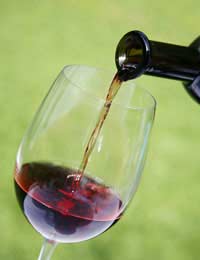Personal Safety When Drinking Alcohol

Red wine makes us live longer… a pint of beer improves your sight… beer before wine and you’ll be fine… there are plenty of factoids and myths about the powers of alcohol. But overstep the limits and you’re at risk of serious illness brain damage, and even cancer. How can you reduce your risk? And how much is too much, anyway?
Safe Drinking
Drinking alcohol isn’t all bad: drink the right tipple at the right rate, and you can actually improve your health! Did you know, for instance:- Low to moderate intake (1-3 units per day) improves your resistance to coronary disease
- One to three drinks a day is said to reduce your risk of mental health problems such as dementia or Alzheimer’s (Erasmus University Medical School, 2002)
- One small glass of red wine per day can reduce a woman’s stroke risk by up to 50% (A.Malarcher, 2001)
- Red wine from France and Sardinia, rich in procyanidins, has been linked to longer lifespans (R.Corder, 2006)
- Ale and stout contains antioxidants which have been shown to reduce the risk of cataracts (consumed at the rate of one unit per day) (J.Trevithick, 2000).
It’s recommended that men drink no more than three or four units per day, and for women only two to three are advised. Here’s a quick guide to the unit ratings of your favourite drinks:
- 1 pint beer (5% vol): 3 units
- 1 pint lager (3% vol): 2 units
- 1 small glass wine (12% vol): 2 units
- 1 measure spirit (40% vol): 1 unit
Alcohol Poisoning
The effects of alcohol are biphasic, which means that they occur in identifiable phases. The first, of course, is relaxation and loss of inhibition; this can be followed by dehydration, nausea, headaches, and – in some cases – even worse symptoms. Watch out for the symptoms of serious alcohol poisoning:- Passing out.
- Difficulty breathing.
- Throwing up.
- Skin cold and blue, particularly beneath fingernails.
Avoiding a Hangover
A hangover is your body’s way of warning you against excessive consumption. Symptoms include headache, dry mouth and dizziness. It is thought that hangovers are primarily caused by dehydration, so drinking lots of water between your alcoholic drinks can help reduce their effects. Because women’s bodies contain a lower percentage of water than men, women cannot drink as much as men before acquiring a hangover. It’s also true that some types of alcohol make you more susceptible to hangover than others. Spirits (such as brandy, gin and vodka) and wine (red and white) contain more congeners (the by-products of fermentation), which have been shown to cause worse after-effects.Drinking and Work
For employers, alcohol consumption can sometimes be a concern. Some organisations include alcohol screening as part of their recruitment process. Others develop an alcohol policy in consultation with their staff. It is reasonable for employers to offer help where an employee’s drinking becomes an evident problem. At some point, discipline would also be expected; but this should be outlined in the staff policy. It’s a good idea to be aware of your employer’s stance on drinking and how it affects your work.
Related Articles in the 'Adult Safety' Category...
- Safety Tips for Men
- Personal Safety on the Street: How Much Should I Worry?
- Personal Safety in Hotels and Hostels
- Personal Safety Abroad
- The Role of Victim Support
- Mobile Phones as Safety Devices
- Personal Safety When Dating
- Personal Safety After Dark
- Personal Safety When Driving
- Personal Safety At Work
- Staying Crime Aware
- Personal Safety When Withdrawing Money
- Personal Safety And DIY


Re: Personal Safety Abroad
My gf found out I was flirting so to get revenge she tied me naked to a bed in a hotel then rang room service BTW it was my bday and she…
Re: Personal Safety Abroad
Stepfather raped me Six times Before he died When I He pulled my hair and dragged me into the house When I was talking to the staff at…
Re: Personal Safety Abroad
Stepfather raped me Six times Before he died When I He pulled my hair and dragged me into the house When I was talking to the staff at…
Re: What is Stranger Danger
Hi don’t like walking around town waking to swimming Alford
Re: The Role of Victim Support
What should I do if ,lets say I pay for the house which is on rent and then ,the landlord fails to vacate the house? You call him…
Re: Personal Safety on the Street: How Much Should I Worry?
None - Your Question:I have been unfairly cautioned by police after an attack.The man who…
Re: Personal Safety on the Street: How Much Should I Worry?
I have been unfairly cautioned by police after an attack.The man who punched me lied to…
Re: Personal Safety Abroad
Can I get justice for this even if the woman that destroyed me is dead and I have no proof of this because I never told anyone till now.So…
Re: Learning About Self Defence
I really find these articles very helpful as far as safety is concerned. I appreciate if more of such articles are sent to my mail…
Re: What is Stranger Danger
Some tips on how to keep your young ones safe: 1. If you do feel uncomfortable about somebody talking to you just kindly say. I promise…